
Journal of Environmental Science and Management
Scope & Guideline
Exploring critical issues in environmental policy and management.
Introduction
Aims and Scopes
- Environmental Assessment and Management:
The journal emphasizes the assessment of various environmental components, including water quality, biodiversity, and ecosystem health, often employing quantitative methodologies such as geospatial analysis and modeling. - Community and Stakeholder Engagement:
Research often explores community perceptions and participatory approaches in environmental management, highlighting the importance of local knowledge and social dynamics in conservation and resource management. - Sustainable Development and Resource Management:
A consistent focus on sustainable practices in agriculture, fisheries, and urban development is evident, with studies addressing the balance between human needs and environmental conservation. - Impact of Climate Change:
The journal investigates the effects of climate change on ecosystems and communities, analyzing adaptive strategies and resilience in various sectors. - Pollution and Remediation Techniques:
Contributions include studies on pollution sources, impacts, and remediation, particularly in relation to water and soil quality, as well as innovative methods for reducing environmental contaminants.
Trending and Emerging
- Climate Change Adaptation Strategies:
Recent publications increasingly emphasize the development and evaluation of adaptation strategies for communities facing climate change impacts, showcasing the urgency of this global issue. - Biodiversity Conservation and Management:
There is a growing trend in research dedicated to biodiversity assessments and conservation efforts, particularly in unique ecosystems like mangroves and coral reefs, aligning with global calls for biodiversity preservation. - Water Resource Management:
Studies addressing water quality, availability, and management practices are on the rise, reflecting ongoing concerns about water scarcity and pollution, particularly in agricultural contexts. - Use of Innovative Technologies:
The integration of advanced technologies, such as remote sensing and bioindicators in environmental assessments, is becoming more prevalent, indicating a trend towards data-driven and technology-enhanced research. - Waste Management Innovations:
Emerging themes focus on sustainable waste management practices, including community engagement and innovative recycling techniques, reflecting a societal shift towards sustainability.
Declining or Waning
- Nuclear Energy Viability:
Research on nuclear energy, including its environmental implications and viability, has become less prominent, possibly due to diminishing interest in nuclear solutions in favor of renewable energy alternatives. - Traditional Resource Extraction Studies:
Papers focusing solely on traditional resource extraction methods without considering innovative or sustainable practices are appearing less frequently, indicating a shift towards more sustainable management approaches. - Generalized Environmental Policies:
There is a noticeable decline in studies that merely evaluate existing environmental policies without proposing actionable improvements or community-based adaptations, reflecting a move towards more proactive and solution-oriented research.
Similar Journals
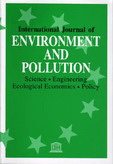
INTERNATIONAL JOURNAL OF ENVIRONMENT AND POLLUTION
Empowering Researchers to Tackle Global Environmental ConcernsInternational Journal of Environment and Pollution is a pivotal publication in the field of environmental science, dedicated to advancing knowledge concerning pollution and its multifaceted impacts on ecosystems and human health. Published by InderScience Enterprises Ltd, this journal, which has been in circulation since 1991, serves as a vital platform for researchers, professionals, and students interested in the management, monitoring, policy, and law associated with environmental issues. With an ISSN of 0957-4352 and E-ISSN 1741-5101, it offers a critical perspective on pollution challenges, emphasizing Waste Management and Disposal. Although placed in the Q4 quartile of its categories, it remains an important resource for understanding the complexities of environmental impact, contributing to policy formulation and ecological research. The journal does not offer Open Access, but it can be accessed through various academic libraries and institutions that value comprehensive studies in environmental management. Engage with the latest findings and discussions that address pressing environmental concerns today!

Environmental Processes-An International Journal
Exploring Interdisciplinary Insights in Environmental ScienceEnvironmental Processes-An International Journal, published by SPRINGER INT PUBL AG, serves as a vital platform for researchers and professionals dedicated to the dynamic field of environmental science. Established in 2014, this journal has rapidly gained prominence, currently holding a commendable Impact Factor and achieving impressive Scopus Rankings across various categories, including Q1 status in Water Science and Technology and Q2 in areas such as Environmental Engineering and Health, Toxicology and Mutagenesis. The journal emphasizes innovative research that contributes to the understanding and management of environmental processes and policies, addressing urgent challenges facing our planet. With a focus on high-quality, peer-reviewed content, Environmental Processes invites contributions that explore interdisciplinary approaches, making it a critical resource for scholars, policy-makers, and students invested in fostering a sustainable future through rigorous scientific inquiry. Access options are available for diverse readership, ensuring that essential findings are disseminated widely to inform decision-making and cultivate impact.

Global NEST Journal
Pioneering research for a healthier planet.Global NEST Journal, published by the GLOBAL NETWORK ENVIRONMENTAL SCIENCE & TECHNOLOGY, stands as a vital resource for researchers and practitioners in the field of environmental science. With its established trajectory since 2001 and a current category quartile ranking of Q3 in Environmental Science (miscellaneous), this journal serves as an important platform for disseminating innovative research and insights that address pressing global environmental challenges. Based in Athens, Greece, the journal is accessible to a wide audience, facilitating collaboration and knowledge sharing across disciplines. Despite its open access status being unspecified, the Global NEST Journal aims to enrich the academic community by publishing original research articles, reviews, and case studies on various aspects of environmental science and technology. By fostering a deeper understanding of complex environmental issues, this journal not only enhances academic discourse but also contributes to practical solutions for a sustainable future.

Present Environment and Sustainable Development
Transforming environmental challenges into sustainable solutions.Present Environment and Sustainable Development, published by ALEXANDRU IOAN CUZA UNIVERSITY PRESS, is a prominent open-access journal dedicated to advancing knowledge in the field of environmental science and sustainable development. Since its inception in 2014, the journal has provided a platform for researchers, professionals, and students to disseminate transformative ideas and innovative research aimed at addressing crucial environmental challenges. With its ISSN 1843-5971 and E-ISSN 2284-7820, it emphasizes the necessity of sustainable practices in contemporary society, facilitating interdisciplinary approaches that unite various fields, including ecology, policy, and socio-economic studies. Based in Iasi, Romania, this journal plays a vital role in fostering international collaboration and dialogue on sustainability, making it an essential resource for anyone committed to understanding and improving the environment for future generations.
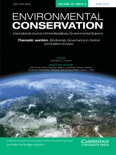
ENVIRONMENTAL CONSERVATION
Navigating the Challenges of Environmental SustainabilityENVIRONMENTAL CONSERVATION, published by Cambridge University Press, is a premier academic journal dedicated to advancing the field of environmental science and conservation. Since its inception in 1974, this journal has established a robust reputation, currently holding prestigious rankings in various categories including Q1 in Nature and Landscape Conservation and Q1 in Water Science and Technology, alongside notable Q2 rankings across several related fields. With its broad scope, ENVIRONMENTAL CONSERVATION covers critical topics in health, toxicology, pollution control, and environmental policy, making it an essential resource for researchers, professionals, and students aiming to address the pressing challenges of environmental sustainability. Despite not being an open-access journal, its impactful content, demonstrated by its significant positions in Scopus rankings, enhances scholarly discourse and informs policy worldwide. As we approach its 50th anniversary, this journal remains pivotal in fostering innovative research and promoting best practices in environmental stewardship.

Rocznik Ochrona Srodowiska
Connecting Ideas and Innovations in Environmental ScienceRocznik Ochrona Srodowiska, published by the Middle Pomeranian Scientific Society for Environmental Protection, is an esteemed journal dedicated to advancing the field of environmental science in Poland and beyond. With an ISSN of 1506-218X, this peer-reviewed journal has established itself as a vital resource since its inception in 2007, addressing various environmental issues and promoting sustainable practices. Currently holding a Q3 category ranking in the Environmental Science (miscellaneous) field for 2023, it places itself in the 23rd percentile of Scopus rankings, reflecting a growing influence in the broader environmental research community. While the journal is not open access, it serves as an important conduit for researchers, professionals, and students to disseminate their findings and contribute to the interdisciplinary dialogue aimed at tackling pressing environmental challenges. With a commitment to rigorous research and practical applications, Rocznik Ochrona Srodowiska remains an essential platform for fostering innovation and collaboration in environmental studies.

EARTH is a prestigious journal published by MDPI, located in Switzerland, with a commitment to advancing the fields of Earth and Planetary Sciences and Environmental Science. Launched in 2020, the journal emphasizes an open-access publication model, ensuring that high-quality research is widely accessible to the scientific community and beyond. As of 2023, it proudly holds a Q2 ranking in both the Environmental Science and Earth and Planetary Sciences categories, indicating its significant impact within these disciplines; it ranks #90 out of 219 and #70 out of 159 in their respective fields according to Scopus. With the convergence of multidisciplinary research and the critical challenges our planet faces, EARTH seeks to publish innovative studies that foster a deeper understanding of geological and environmental processes. Researchers, professionals, and students alike will find this journal an invaluable resource for the latest findings and discussions shaping our understanding of Earth sciences.
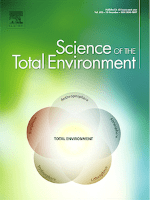
Science of The Total Environment
Leading the Way in Environmental Research ExcellenceScience of The Total Environment, an esteemed journal published by Elsevier, holds a significant position in the field of environmental science, encompassing critical areas such as Environmental Chemistry, Environmental Engineering, Pollution, and Waste Management and Disposal. With an impressive impact factor and ranked in the Q1 quartile across its categories for 2023, the journal is recognized for its high-quality research output and contribution to environmental sustainability. Operating from its base in the Netherlands, the journal has been a valuable resource since its inception in 1972, welcoming innovative studies that address complex environmental challenges. Its notable rankings—such as Rank #9 in both Environmental Sciences and Pollution—underscore its relevance and influence in the academic community. Although the journal currently does not provide an open access option, the robust findings and discussions presented within its pages continue to foster a deeper understanding of environmental issues. Science of The Total Environment is an essential platform for researchers, professionals, and students dedicated to advancing knowledge and solutions in the rapidly evolving field of environmental science.
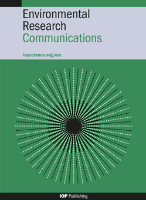
Environmental Research Communications
Exploring innovative pathways to environmental preservation.Environmental Research Communications is a distinguished open-access journal published by IOP Publishing Ltd, focusing on cutting-edge research within the environmental sciences. With an ISSN of 2515-7620, this journal serves as a vital platform for the dissemination of pivotal studies that address urgent environmental issues. Since its inception in 2019, Environmental Research Communications has positioned itself as a reputable source of knowledge, achieving a Q1 ranking in various categories, including Agricultural and Biological Sciences and Earth-Surface Processes, indicating its significant impact in these fields. The journal boasts impressive Scopus ranks, ensuring visibility and recognition among global scholars. With open access options, it encourages a broader readership and fosters collaboration across disciplines, making it an essential resource for researchers, professionals, and students dedicated to advancing the understanding and preservation of our environment.
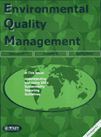
ENVIRONMENTAL QUALITY MANAGEMENT
Pioneering Solutions for Sustainable ManagementENVIRONMENTAL QUALITY MANAGEMENT is a respected journal published by WILEY, focusing on interdisciplinary studies that merge environmental science with public health, management, policy, and law. Since its inception in 1991, this journal has provided a platform for researchers and practitioners to share innovative insights and advancements in understanding environmental quality and its impacts on human health and the ecosystem. With an ISSN of 1088-1913 and an E-ISSN of 1520-6483, it holds a significant position in the academic community, evidenced by its presence in the Q3 quartile across several categories, including Management, Monitoring, Policy and Law, as well as Pollution and Waste Management. Although it is not an open-access journal, it continues to be a vital resource for those in the environmental sector, offering robust evaluations and discussions that advance knowledge and foster improved practices. With Scopus rankings demonstrating its relevance among other titles in the field, ENVIRONMENTAL QUALITY MANAGEMENT plays a crucial role in shaping discourse and informing policy in an increasingly vital area of study.